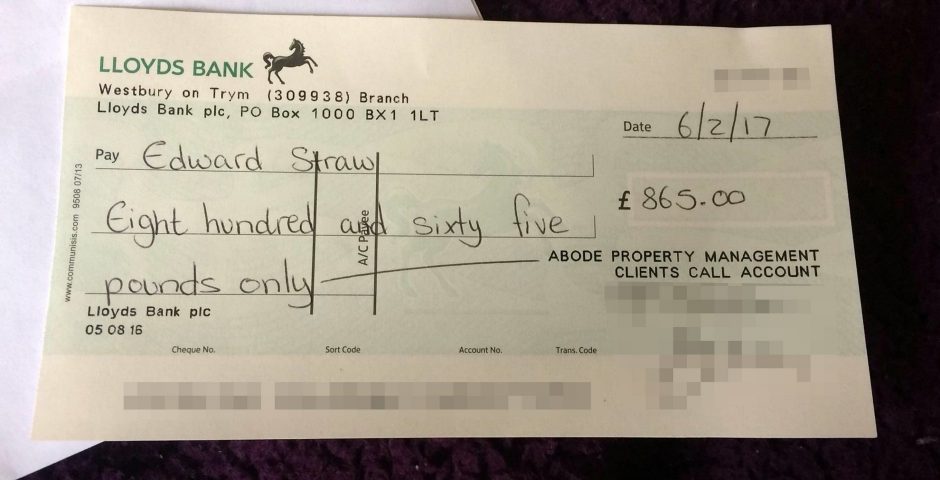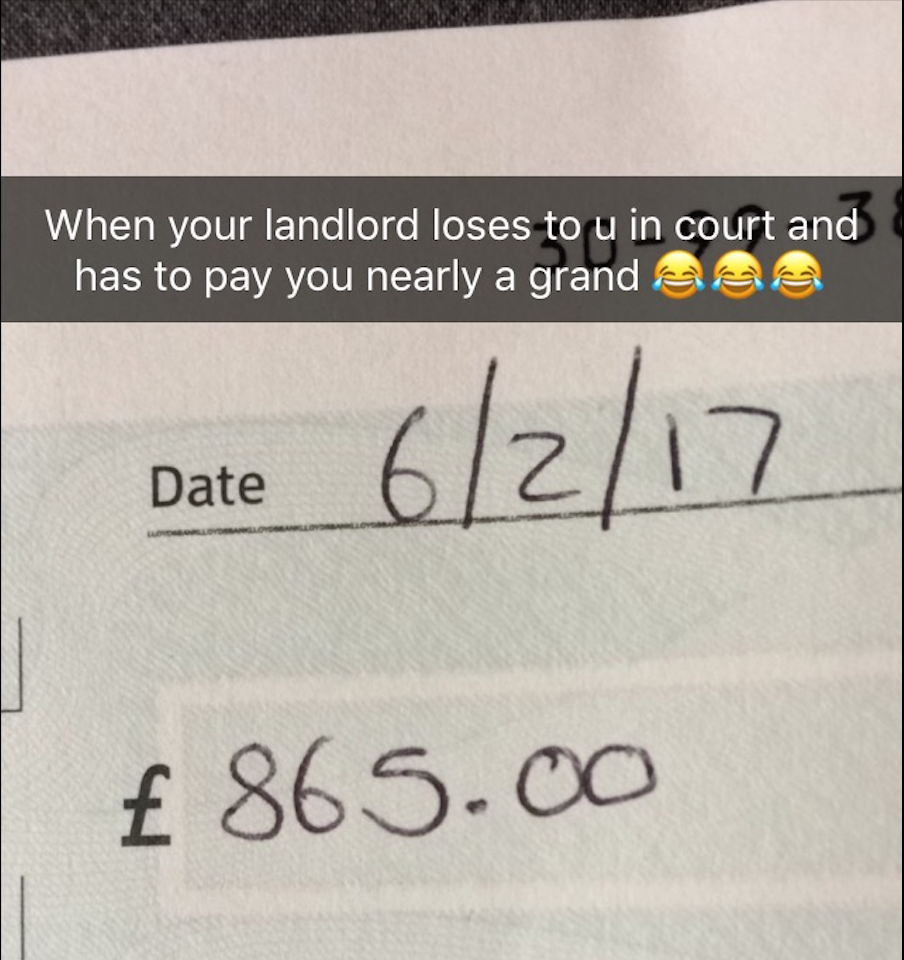
How to sue your landlord: A step by step guide
From someone who won £865
Last month Bristol student Ed Straw’s victory against his landlord hit the national papers.
He successfully took on a letting agent that was charging him and his friends huge fees under questionable circumstances. After taking them to court, the letting agent’s director personally handed them a cheque for £865.
You can read Ed’s story here.

Ed and his housemates
To help other students who are being pressured into paying unfairly high fees, Ed has constructed this helpful guide to make sure you keep your money.
- Email your lettings agency
Ask them to justify all the deductions you think are unreasonable, ask for receipts/invoices for all the work they claim to have done. If they haven’t got a receipt/invoice for something they can’t charge you for it.
Ask for evidence that you were responsible for the anything that needed fixing or cleaning. They’ll need to have before and after photos to show house wasn’t already like that.
Doing this over email is important, if you do it over the phone there’s no record and you can’t use their words against them later.
- Get annoyed when they dodge your questions
They probably don’t have the proof they need, and there’s even a good chance they might not have done the work like they’re claiming. So naturally they’ll just repeat the same things over and over, dodging your requests for evidence and receipts.
- Threaten legal action
Basically, just say “Without sufficient justification for the deductions, and evidence confirming this we will seek to recover the monies through the courts.” Give them a two-week deadline to give you a proper answer.
- Get more annoyed when they keep dodging your questions and accuse you of being aggressive
Letting agencies have a playbook when it comes to dealing with students, it’s only one line long “Wait till they get bored, and stop asking for their money back”.
So, when you tell them you’re willing to take them to court they don’t really know what to do and start calling you names, I was accused of ‘legal posturing’ and taking an ‘aggressive litigious stance’. Don’t let this put you off.

- Read your tenancy agreement (again)
Make sure you know the tenancy agreement inside out, so if they charge you for something not included in it, you can explain why you shouldn’t have to pay.
Charging you for something the agreement doesn’t cover is a ‘Breach of Contract’, and basically an instant win for you.
- If they claim they repainted/cleaned the house go back and check
If you knock on the door of your old houses and say “Hey, our lettings agency is trying to stiff us on the deposit, you mind if I double check they did the work they charged me £704 for?”, there’s not a single student who would say no to that. If it’s not noticeably cleaner or hasn’t been repainted take photos to use as evidence.
- Make sure you’re allowed to sue on behalf of your housemates
This either means being listed as the lead tenant on the tenancy agreement, or getting them to sign something saying;
“I hereby grant (YOUR NAME) permission to communicate with (LETTING AGENCIES NAME) and the landlord they act for, on my behalf both verbally and through written communication, in relation to any proceedings, discussions and negotiations arising with (LETTING AGENCIES NAME) under the tenancy agreement dated (DATE OF AGREEMENT).”
- Check they put your deposit in a deposit holding scheme
They should have sent you a certificate confirming that they did this, but if they didn’t contact all three deposit holding schemes (Deposit Protection Service, MyDeposits and Tenancy Deposit Scheme) and find out if they have any record of your deposit.
Here’s the kicker, if your lettings agent didn’t put your deposit in a protection scheme you’re entitled to sue them for 3 times the total amount of the deposit, regardless of how much they took from you, that’s like a grand and a half each. If your money is in protection scheme email them and make sure they know you’re contesting the deductions.

Ed Straw: housing hero, bird lover, 3rd year student
- Sign up for Money Claim Online
It’s a government website for suing people and your first step in the formal legal process. Then look at your tenancy agreement to get your landlord’s details; you’ll be suing the landlord but it’s your lettings agency which will handle the dispute. This is the dull part, you’ve got to spend about 2 hours filling in forms.
When you get to the part which asks how much money you want back say the exact amount you dispute, then say “Plus costs and 8% interest on the deposit”.
Filing the claim costs £60, but the judge can make your landlord cover the cost if you win. Plus, if you’re from a low-income family you can get it for a reduced amount or even for free. You need to file against them within 3 months of the end of your tenancy. Make sure you say you’re willing to go to mediation, this is important later.
- Get your flatmates/family to help
Seriously, they’ll help remind you of deadlines you can’t miss.
- Submit all your evidence
Every photo of the house you have, testimony from all the tenants as to the condition of the house. For me this was a 30-page document will photos of the house, before and after we lived there, 2 testimonies from me and a housemate and all the emails we’d exchanged with our lettings agency. You must do this at least 14 days before the court date, and you must send the evidence to the court and the landlord for it to be admissible in court.
- Set a court date
The court will phone you up and sort this out with you, make sure you’re not busy then. This costs £25, but you can ask the judge to make your landlord cover the cost.
- Set a time and date for mediation
This is a legally binding over the phone negotiation, you’ll speak to your letting agency through a third party and will try and agree on a sum of money you’re both happy with. Seriously consider any deal they offer you, only reject if you think you’ll get more money at court. If you can’t settle on a figure your court date still stands.

- Go to court
This is the fun part, the judge knows you’re a student, and isn’t expecting you to recite the 2004 Housing Act off the top of your head. The judge will just ask you a few questions and if your lettings agency is anything like mine they’ll forget to show up to court anyway.
Remember the law is designed to protect tenants from bad landlords, so the lettings agency must prove that: they did the work, that the work was needed and that the work was required to fix something you broke of you. If they can’t do any one of these three they lose.
- Win
Seriously, the law is in your favour here. Things should go your way, you might not get everything but you’ll almost certainly get something
- Make sure your letting agency know you won
Contact them when you receive the court order, and ask them how they intend to pay you. They have 21 days to pay you, after that you’re allowed to send bailiffs to go and collect the money.
There’s no right to appeal a small claims court decision, so what the judge says is final.
- Gloat
They’ve given your money back by this point, you’ve won, so enjoy it. Make sure everyone knows what you’ve done, write a Tab article, call your mum, enjoy having your money back.

The recommend method of gloating is framing the judges order for them to pay you £865 as seen above.
Generic legal disclaimer: I accept no responsibility for any action taken regarding this article, and have no legal credentials at all.









































